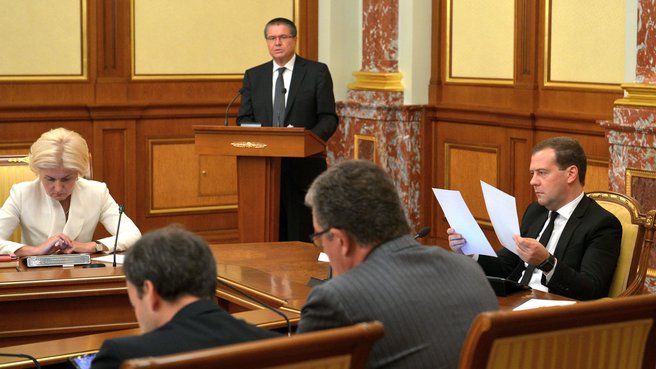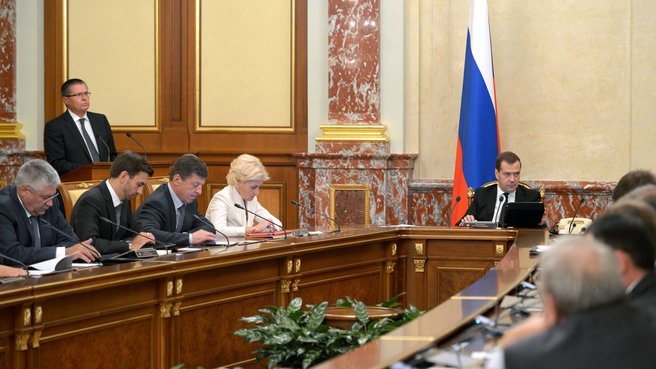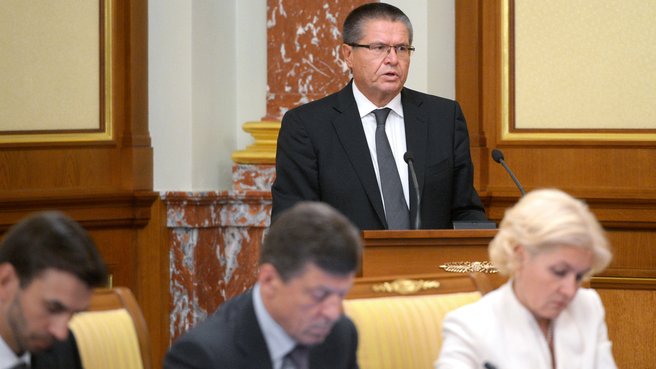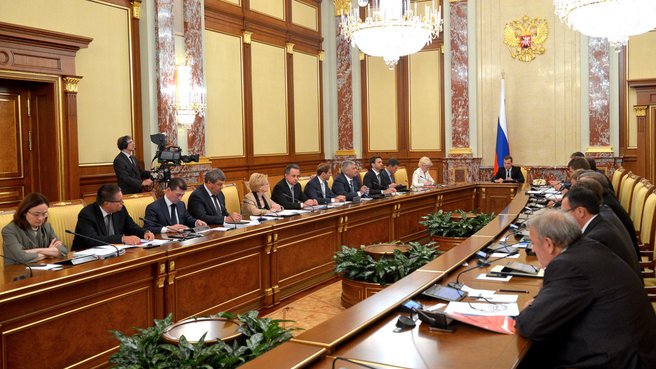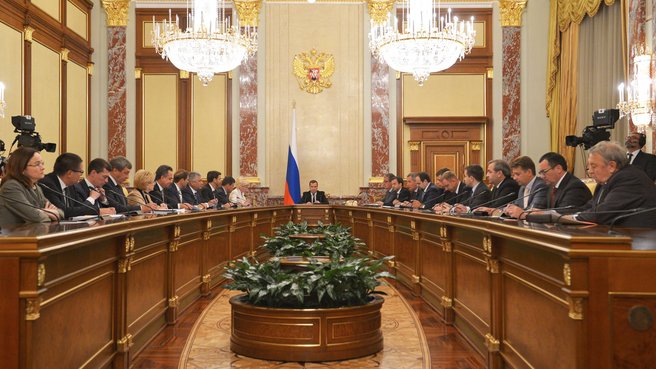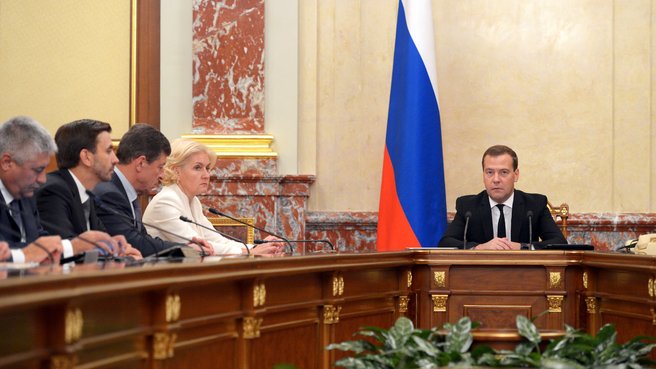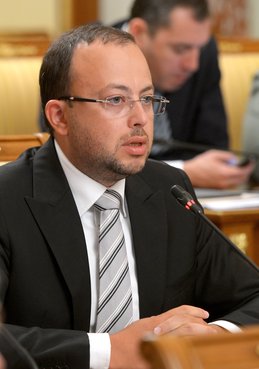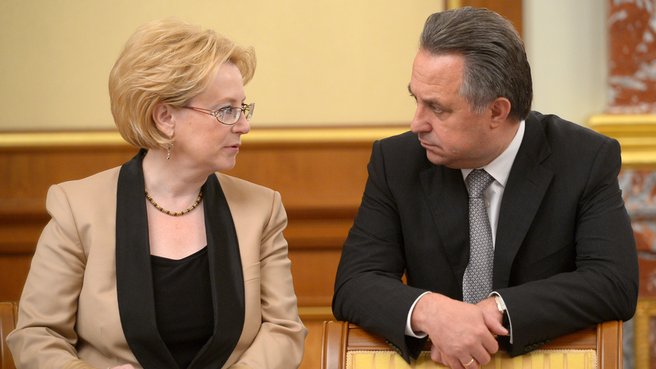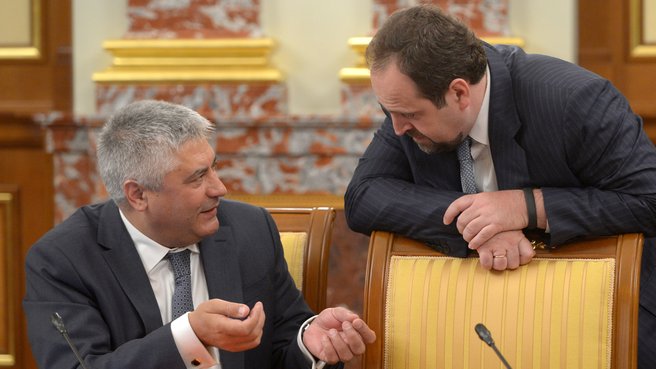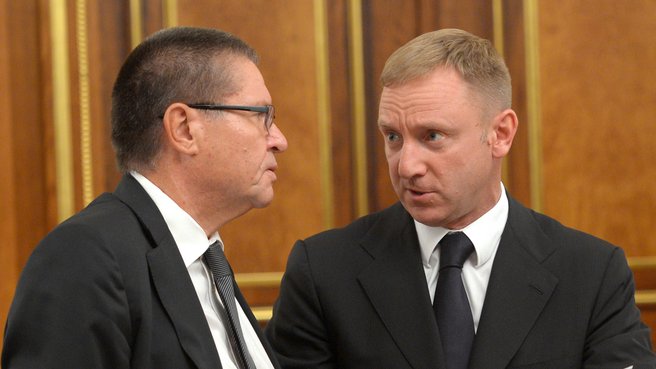Agenda: The Economic Development and Innovation Economy state programme, and 13 other issues.
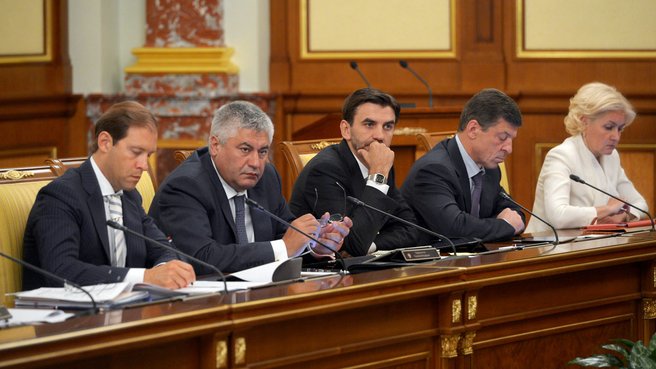
Minister of Industry and Trade Denis Manturov, Minister of the Interior Vladimir Kolokoltsev, Minister Mikhail Abyzov, Deputy Prime Minister Dmitry Kozak and Deputy Prime Minister Olga Golodets
Minister of Economic Development Alexei Ulyukayev reports at the Government meeting
Dmitry Medvedev’s opening remarks
Report on the Economic Development and Innovation Economy state programme by Alexei Ulyukayev
Transcript:
Dmitry Medvedev: I’d like to say a few words at the start of this Government meeting. Before we get down to work, I’d like to say that I have signed the Plan of Measures to speed up economic growth. Let me remind you that that we reviewed this at our last meeting and discussed which steps are needed to increase the investment attractiveness, to develop small and medium-sized businesses and the overall economy, what should be done to invest the National Welfare Fund monies, accumulated pension savings and to adapt our sectors better for working under the WTO system. The discussion was fruitful, the document has been finalised, but the situation remains very complicated. For this reason we have to pursue the plan and think what can be done next, and make adjustments to the plan if needed.
And now onto the agenda. As you know, the draft budget for the period of 2014 to 2016 is being drawn up according to the programme and target principle. Budget expenses are calculated and will be executed in accordance with the state programmes. That’s what we decided on. Hence we are including a number of important sub-programmes in the state programmes, for instance, the Skolkovo sub-programme can be incorporated into the state programme Economic Development and Innovative Economy.
It is common knowledge that innovation is the principal driver of economic growth, a tool for modernisation which was and will remain our unconditional priority. We spoke about this yesterday during the session of the presidium of the Modernisation and Innovative Development Council. Well, the Skolkovo project remains a large innovative project connected with high-tech production, with entrepreneurship, with the transition of the Russian economy to innovative development, that is why the programme deserves careful attention.
It is crucial that we do not just explain the development plans for this project, but also set up pre-requisite conditions. We expect that there will be a concentration of promising developments there and interesting ideas will be born. An innovations conveyer of a sort will be launched. I am talking about all the key areas that, allow me to remind you, we once approved as promising areas, chief areas for innovation, i.e. energy efficiency, nuclear technology, space technology, IT and biomedicine technology. Although, we should not, of course, limit ourselves by only sticking to these key areas.
We also need to convert the scientific results which we have into successful business projects, something which, let’s be honest about it, we do not always manage to achieve. We need a special scheme in place. I mean a legal and tax scheme aimed at supporting startups. We already have a number of projects in this respect. Pharmaceuticals for treating a number of diseases, including complicated ones such as Alzheimer’s disease, for example. There are also a number of projects in the IT sector, including those related to the design of new aircraft, projects in fuel and energy, and nuclear technology.
I hope we’ll continue to improve in this area. It’s very important to ensure that inventions are patented and the number of applications for state registration of new intellectual property grows. We should expect that there will be thousands of them.
It’s also important to cooperate with institutions that are engaged in development, that have real potential, and large venture funds and industrial companies. By kick starting this project and other similar projects, we should reach the point where the public and private sectors can reach parity in funding innovation. We plan to attract over 100 billion roubles in private investment within eight years. I hope this financial support is commensurate with the sponsorship of the world’s leading innovative centres.
We have funds that we also plan to allocate. The figure is substantial and therefore the spending must be controlled.
Obviously, it’s important to support the people involved. We should engage our professionals and also attract non-Russians if necessary. We should bring up a new generation of professionals that will be qualified for this project and many others.
Next I would like to discuss the issue of the national accounting system that provides data for macroeconomic decisions. Our main goal here is to have a Russian statistics system that complies with international standards.
We need to find a common ground in many areas, including statistics, with the international community. This has been extensively discussed. Deviations and misinterpretations often occur because of the difference in our and their calculations. We need to adopt a common methodology for macroeconomic measurements, evaluations of industrial potential and natural resources. That will help to present financial and commodity flows and changes in the structure of the Russian economy more accurately. It will be helpful for a more clear analysis of annual GDP trends and other indices, and for a general correlation between the Russian and global economies.
There is another important issue. August is the first month of harvesting, so we need to discuss developments in the agricultural industry. Today I expect to hear a detailed report on the allocation of subsidies for the regions to support animal farms and start-up farms as well as regional programmes for beef farming and subsidising interest rates on short-term loans for livestock breeders and crop farmers. These allocations must be delivered to the farmers immediately after the relevant decisions are made. The Minister of Agriculture will report on all these issues.
Now let’s start. Mr Ulyukayev (Alexei Ulyukayev, Minister of Economic Development) will report on the first issue. Please.
Alexei Ulyukayev: Mr Medvedev, colleagues. The state programme on economic development and an innovation-driven economy was approved last March. It contains objectives and describes the general development trends to shape a productive business environment and stimulate investment and innovation activity. It seems reasonable to expand it with a subprogramme to create favourable conditions in terms of logistics, infrastructure, legal support and taxation for the entire cycle of research and development and for commercial applications.
Today we would like to present the subprogramme on the development of the Skolkovo innovation centre that could be integrated with the above state programme. Formally, as you said, Mr Medvedev, this will allow us to change the form of funding from budget grants to targeted funding, which would conform to the common budget procedure.
The implementation of this subprogramme will allow to develop and introduce a mechanism of creating innovation ecosystems indispensable for the functioning of hi-tech companies producing intellectual products that could subsequently be commercialized. Such innovation ecosystems could be replicated in the future. I think this approach will prove suitable for other development institutions as well.
The ecosystem of the Skolkovo innovation centre comprises three major components.
First, the project participants – several high-tech startup companies. Second, industrial and financial partners of the project that focus on research and design under the project, or providing project funding, and third, the Technical University.
As the Prime Minister has already mentioned, work is underway in five main areas, such as information technology, biomedicine, energy efficiency, nuclear technology and space technology. Much has been done in less than three years of work. Almost 1,000 startups have been involved in the project that provide employment to 13,000 people. Their earnings for the first six months of 2013 amount to over 4.5 billion roubles. Over the past 12 months, 204 applications for registering intellectual property have been filed in the five priority areas that I mentioned and which represent about one-quarter of the applications that have been submitted for registration in the area of intellectual property rights in Russia.
Our partners are becoming more active as well. Over 30 major Russian and international companies, including Siemens, IBM, Intel, Samsung and Russian companies Renova, AFK Sistema, LUKoil, and KamAZ have signed an agreement to open their research units under the project. Under these agreements, these companies’ budget for creating R&D centres up until 2015 is expected to amount to about 30 billion roubles. About 3,500 employees will work in these research centres with an area of 150,000 square metres.
The accreditation of venture investors amounted to 21 billion roubles, of which foreign venture capital funds make up over one-third, or 7.5 billion, and Russian venture capital funds amount to 13.5 billion. The university – the Skolkovo Institute of Science and Technology – is being created, which, in partnership with major international educational and scientific centres, primarily MIT (Massachusetts Institute of Technology), will start working in this area. It has 70 students now, and the first 20 professors will graduate in 2014. Six research centres have been created in Skolkovo.
The subprogramme provides for three basic activities. First, creating and developing an innovation-based environment. Second, creating and developing the Skolkovo Institute of Science and Technology. Third, creating and managing the infrastructure in Skolkovo. The total amount of federal budget funding for the subprogramme until 2020 amounts to 135.6 billion roubles. That amount includes 57 billion for the Innovative Environment, 32 billion for grants for project participants, 42 billion for the Skolkovo Institute of Science and Technology, and 37 billion for the Infrastructure of the Innovation Centre project.
The Innovative Environment project is entirely based on the participants of the project, such as start-ups, the technology park, research centres and the R&D centres of industrial partners, venture investors as financial partners and the communications medium. The main performance criteria should include an increase in the number of internationally recognised patents and applications for registering intellectual property, an increase in the revenues of the project participants, growth of private investment, cutting the time that it takes to take an R&D product to the market and the project’s overall contribution to the Russian economy.
The second project’s goal is to create new competences in the field of research, development and commercialisation of the results based on effective cooperation with international research centres. The main performance indicators here include the share of graduates engaged in innovative activities on a professional basis and the activities of the institute’s researchers aimed at creating research papers that are published internationally.
The third infrastructural project seeks to create a comfortable and supportive environment for work and social services for the project participants, serving as an additional factor for motivating their good work.
This project includes building the Skoltech complex, the Technopark R&D centre and social infrastructure and intra-urban utilities systems.
The creation of the Skolkovo innovation centre by 2020 will lead to opening at least 50 R&D centres, creating more than 1,000 startups and ensuring the full-fledged functioning of Skoltech, meaning the 15 research centres operating under its auspices. It will have about 50 professors, 1,200 post-graduate students and researchers.
It is assumed that the total amount of funding for the subprogramme will amount to 502 billion roubles, of which nearly three quarters (73%) will come from extra-budget financing, financing by private businesses, and 135.6 billion, or 27%, will be funded from the federal budget.
The implementation of the project and the subprogramme will significantly boost the innovation-based economy. It is projected that the annual volume of patent applications will exceed 350, with 60 foreign patent registrations. Private investment in innovative companies in 2020 will amount to 25 billion annually. The overall investment in the projects and the economy will amount to about 200 billion. The annual revenue of the companies involved in R&D activities under the project will amount up to 100 billion roubles. We believe that this model could be replicated in the regional innovative clusters. This project has been agreed with the Ministry of Finance, the Ministry of Education and Science, and the Federal Customs Service. I would like to have this motion seconded.
Dmitry Medvedev: Thank you, Mr Ulyukayev. Does anyone have any comments?
Arkady Dvorkovich (Deputy Prime Minister): I would like to say a few words about the relations between Skolkovo and other Russian centres of innovation, education and research. This is a critical element of the proposed programme.
We believe that Skolkovo should be considered not only as a unique emerging innovation centre, but also as an opportunity to attract highly qualified professionals and invest in innovation and the entire Russian economy.
This is an issue of establishing cooperation with the Russian Academy of Sciences and its institutes, which have gained considerable expertise in basic research, which can be, including through Skolkovo’s mechanisms, used for creating market technologies and commercialising the ideas developed by the academy. The issue also concerns regional centres with different statuses, such as science towns and industrial parks, which exist in about 20 Russian regions. These relations are being built with Skolkovo serving as a methodological centre for selecting promising projects. These activities are highlighted in the subprogramme. Finally, the issue also concerns international cooperation, including with our close neighbours, such as Belarus, Ukraine, and Kazakhstan, and our partners in the so-called “far abroad”.
This aspect of Skolkovo that concerns not creating the physical infrastructure, or forming a new university, but rather serving as a nucleus for the other centres, is a major, innovative part of this programme as compared to previous Skolkovo-related programmes.
Dmitry Medvedev: Thank you. Are there any other comments? Mr Fortov, (Vladimir Fortov, President of the Russian Academy of Sciences) please go ahead.
Vladimir Fortov: Thank you, Mr Medvedev. Skolkovo is a very important element of our innovation-based system, and it is good that it is developing so fast. However, I think that there is one thing that we did not discuss sufficiently.
When we were organising Skolkovo, one of this project’s goals was to make sure that our innovation-based economy uses numerous scientific ideas generated by applied and academic institutions. This is a hard thing to do. When the Americans were summing up the achievements of the past millennium, they said that creating the innovative system was the biggest achievement. Not even the laser, or the discovery of nuclear energy. That is because the innovation-based mechanism is now underway, and the US economy is doing just fine using it. That is an example. I believe that Skolkovo has an important mission, which is to find a model to promote growth in Russia.
There is no one-size-fits-all approach for building an innovation-based economy. Each country does it its own way. The French do it their way, and the Koreans do it their own way as well. You are well aware of it. I believe that as we discuss the outlook for Skolkovo, it is good to keep in mind that the most important thing is to find the sequence of steps that we can use to build a viable economy.
We have several comments regarding the wording of the draft. For example, it does not say a lot about science, although we know from our experience that only scientific advances can help achieve real progress in industry and the real economy. This issue is not very obvious either because different countries used different approaches to do it. For example, the young tigers, such as Korea, Japan and some others, did not focus much on science early on. They were buying research from other countries and successfully implementing it in their products.
At some point in time, when a country reaches a good level of development, this model stops working, and countries need to engage in their own research. Thus, Japan, Korea, and Singapore are now investing a lot of money into research. I believe that we should also pay attention to this and emphasise the role of science and education in this important area.
Dmitry Medvedev: Thank you. I completely support at least the first part of what Mr Fortov has said. The task of Skolkovo and such projects in general is not simply to produce new inventions and patent them (this is important but it is possible to do this without Skolkovo; although it is probably easier to do this within such projects because they get benefits, they have an appropriate micro-environment, it is possible to get required equipment and so on) but to create an innovative system. Currently it does not exist in Russia, and such projects are created exclusively for its sake. This system cannot be international. Naturally, it should be based on the achievements of humanity, it should use the most advanced experience, and we ought to do it and we invite foreigners to this end. However, it should be tailored to the Russian Federation. Russia has its specific conditions. Likewise, the US has specific conditions, and France has specific conditions. It will always have a national character, but will reflect world experience, which should be used to the best effect. Hopefully, this will be done.
Do you want to make any comments? An Expert Council member is in attendance. Go ahead, Mr Bragin.
Alexander Bragin (member of the Russian Government’s Expert Council and executive director of the Forum Analytical Centre): Mr Medvedev, Government members and meeting participants, the Expert Council has examined this subprogramme. I want to thank the Ministry of Finance and the Ministry of Economic Development for close cooperation and expert comments that have generally been taken into account. The Expert Council generally supports this subprogramme.
Last year the Expert Council reviewed and analysed many state programmes; and this subprogramme surpasses other programmes by its elaboration, details, description of results and risks, and importantly, its clear description of efficiency indicators which are linked to actions and funding. And in this respect, experts believe that this subprogramme, with its approaches and content, can serve as a good example for other departments should state programmes be finalised and improved.
Regarding the quantitative side of the indicators. They are rather ambitious, befitting a project on this scale. These indicators have been compared with foreign analogues, with European innovative centres, in the case of Skoltech (Skolkovo Institute of Science and Technology) – with leading US universities. The tasks set for this project and its managers are global in scale. Given the programme’s format and content and indicators, it creates clear expectations: experts have clear expectations regarding research and development and multiplier effects for the economy.
A few words on implementation. Experts believe that it is important that the programme describes risks. The personnel risk and the demand risk for innovations are significant. But we all realise that under this project a whole new state will not be built, and the indicators to be achieved are closely linked with all those measures that the government is taking to improve the national investment climate.
The project needs a continuous state support, and not only financial support. This support will bring the project closer to achieving those ambitious indicators and advance the project, or roll it back without state support.
Exerts also believe that given the scale of the tasks and the level of funding (which is significant) it is very important to ensure that there is high-quality corporate management, transparency in the distribution of funds and that managers are responsible for achieving results.
I want to support what other people have said: it is important to promote Skolkovo’s experience in regions, in innovative towns and in federal research centres. The Expert Council proposes generalising the approaches in 2014 and making a proposal on how to promote it. We also believe that it is important to discuss issues and approaches to promoting Skolkovo’s experience outside of Russia in 2014.
And a couple of words on expert and public monitoring and oversight of the subprogramme. The programme includes clear reference points, and indicators are listed according to years. It is important that experts, project participants, venture funds and potential investors participate in analysing the implementation process. In this respect, Mr Medvedev, the Expert Council proposes creating a working group under the commission for modernisation. The working group will monitor this project and regularly analyse it in a transparent format. If you support it, we can include it in the minutes.
Although the programme answers many questions and spells out details, the experts suspect that the public does not have a clear concept of the goals and tasks of the project. Even representatives of the business community, which is somewhat closer to the project, do not make a distinction between the fund, innovative town and Skoltech (even if we do not take into account the management school), so it is important to regularly and continuously explain to the public in clear terms the goals and tasks, and the achieved and expected results. Experts have proposed holding a public and expert discussion of the Skolkovo development concept and presenting the final report at the annual innovation conference this autumn. That concludes my report.
Dmitry Medvedev: Thank you very much.
I suggest we draw a line under this discussion and take a decision in light of what has been discussed. Agreed.
<…>
